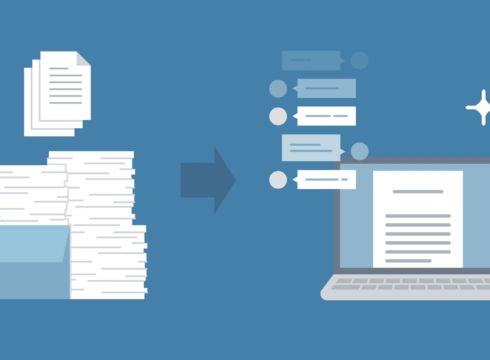LLMs can improve government correspondence by writing formal emails and responding to internal inquiries quickly for greater productivity
By guaranteeing improved legal compliance, LLMs are transforming the legal industry.
Let’s understand how generative AI is playing a crucial role in transforming public services
Inc42 Daily Brief
Stay Ahead With Daily News & Analysis on India’s Tech & Startup Economy
Generative AI is transitioning from a novelty in personal applications to a disruptive force in a variety of tasks. The driving force behind this AI is Large Language Models (LLMs). Professional fields are currently benefiting from its advancement, as businesses use AI to provide individualised services such as financial advisers, welcome videos, and personalised suggestions.
LLM has shown promise in government operations as well. These AI assistants with strong policy expertise can improve policy analysis and communication. Global governments are currently investigating or incorporating these methods, suggesting a change toward a better-informed and effective public.
Due to LLMs’ variety in content development, data and document analysis, and language processing (translation and conversation), “smart” government applications that automate and enhance services are possible.
This has the potential to completely transform public service delivery by improving responsiveness and efficiency in government operations. Let’s delve in-depth and understand how generative AI is playing a crucial role in transforming public services.
Understanding Natural Language
The use of generative AI in chatbots and call centre operators, such as DISHA from IRCTC, is revolutionising citizen-government interactions and helping people who are not as comfortable navigating websites.
These AI capabilities enable ticket purchases and complaint filing via text or speech. LLMs expedite answers to policy-related inquiries by streamlining information management, creating reports, and evaluating documents.
One excellent example of how LLMs can be used as knowledge reservoirs for new hires is the U.S. Department of Labor’s use of them for legal document classification.
Analytical proficiency
Large dataset analysis (spreadsheets, CSV files) is where generative AI shines. It also aids in trend identification and data visualisation. Through the use of submitted data, LLMs forecast outcomes, enabling governments to make evidence-based policy decisions.
LLMs, for instance, can be used by a city preparing to enact new transportation laws to assess how those laws have fared in other places.
Enhancing Communication
LLMs can improve government correspondence by writing formal emails and responding to internal inquiries quickly for greater productivity. Additionally, by translating communications and documents into other languages, LLMs can remove language obstacles.
All citizens will be able to obtain vital information thanks to this increased inclusion and accessibility. To guarantee that all residents have access to vital information, LLMs can assist the Central Government in translating communications into state languages.
Legal Assistance And Compliance
By guaranteeing improved legal compliance, LLMs are transforming the legal industry. They make it easier to annotate legal materials semantically, which helps with the classification and interpretation of complicated legal papers.
Governments are now better equipped to create and evaluate legal documents with more accuracy and efficiency. LLMs, for instance, can be used by environmental regulators to monitor industrial pollutants and identify possible infractions of environmental standards.
Training And Development
To create training materials for government officials that are customised to their roles and skill levels, LLMs play a crucial role. Their capacity for brainstorming generates ideas and novel strategies that support ongoing education and skill improvement.
To cover certain trade agreements, rules, and negotiation strategies, for instance, a department that focuses on international trade can engage LLMs to build tailored training programs.
Crisis Management and Response
LLMs are capable of handling communication channels, updating the public in real time, allocating resources optimally, and directing aid to the areas that require it most during natural disasters. State governments can use LLMs to post updates on social media during emergencies like earthquakes or floods informing the public about safe ways to evacuate, where to find refuge, and other important information.
As Productivity tool
Governments can develop and incorporate their own AI co-pilots into e-office systems to perform a range of functions, such as creating papers, responding to inquiries, scheduling, and evaluating dashboard data.
Government productivity is increased by LLM-based apps like “Ask Jeeves,” which provide current knowledge on laws, rules, and regulations, improve data analysis, and simplify work management.
Personalised Communication
By improving individualised communication within a range of public services, LLMs may guarantee that citizens receive pertinent information and guidance. By accommodating a range of needs and preferences, promotes inclusion and responsiveness.
Societal Impact Of Generative AI
Although generative AI offers a lot of potential applications, some issues need to be resolved, including data security, privacy, and potential biases in the algorithms. To guarantee its responsible usage, clear guidelines and strong control procedures are necessary.
Another important factor to take into account is how society will perceive the tool’s impact on public services, given its ability to completely transform responsiveness, accessibility, and inclusivity.
Imagine a society in which residents receive customised traffic alerts to prevent gridlock, individualised energy usage guidance based on consumption trends, or reminders for immunizations.
Tailored instructional materials could be advantageous for students, and government benefit programs such as “Parivar Pehchan Patra” could be utilised to identify and inform eligible residents about healthcare benefits, pensions, and scholarships.
We are still in the early stages of generative AI and LLM integration with government services. Even with issues like data privacy, research in the future can merge it with other technologies like blockchain to further improve services.
LLMs must change with the needs of society. Governments can improve decision-making, communication, and ultimately public service by utilising LLMs’ capabilities. This is about using technology to create a more inclusive and citizen-centric future, not just about efficiency.
{{#name}}{{name}}{{/name}}{{^name}}-{{/name}}
{{#description}}{{description}}...{{/description}}{{^description}}-{{/description}}
Note: We at Inc42 take our ethics very seriously. More information about it can be found here.


